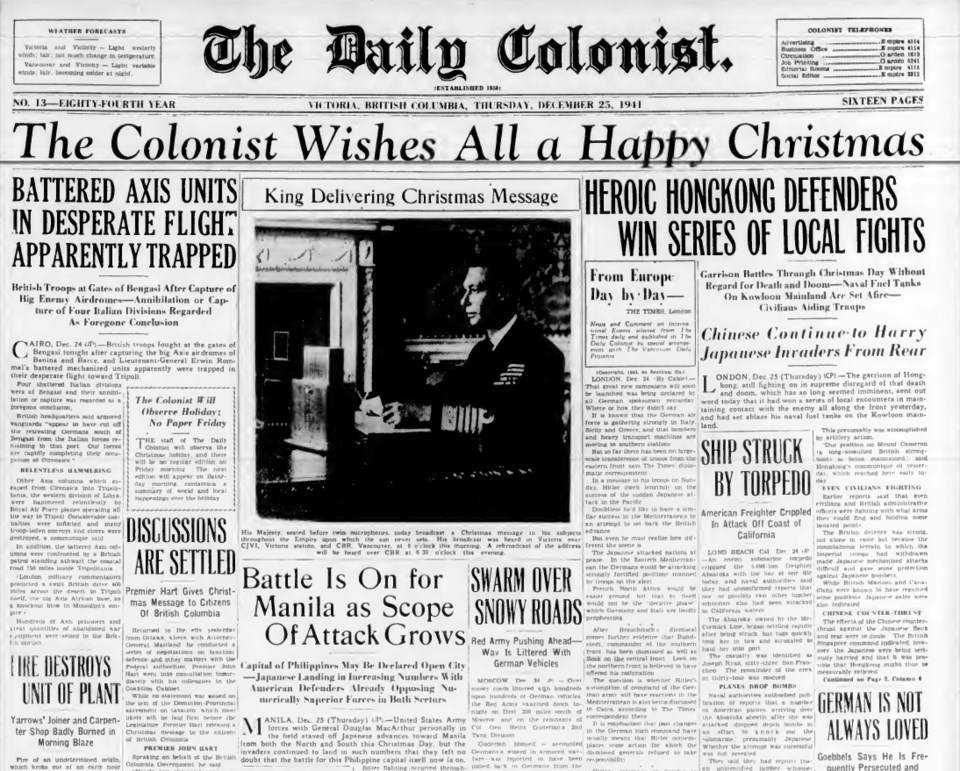Seventy-five years ago, Victoria experienced one of the toughest Christmas seasons in its history. Christmas is a time to express our faith, to celebrate family, to talk of peace and love, to give to others, and to be thankful for what we have. The spirit of Christmas was surely tested in 1941.
“There is fear; there are forebodings; there is the sword of Damocles hanging over countless homes,” the Daily Colonist said in an editorial.
It was the third Christmas of the Second World War, and for the first time, Victoria was feeling the war’s direct impact. After the Japanese attack on Pearl Harbor, there were fears that Vancouver Island would be hit. On Christmas Day, Hong Kong fell.
“We must remember that Pearl Harbor was attacked on a Sunday and we, here, must not relax our vigilance for a single moment,” said Maj.-Gen. R.O. Alexander, commander of the Canadian army’s Pacific Command.
“The best Christmas present you can give to those who are dear to you is to insure, to the best of your ability, that they are defended from the possible action of a treacherous and barbaric enemy,” he told his troops.
The Colonist and the Victoria Daily Times said that in a blackout, vehicle headlights would need to be masked, with only a slit three inches long by one-quarter of an inch wide allowed. The speed limit would be 15 mph.
Instructions on what to do in an air raid were sent to all residents, and posters were placed in public buildings.
On Dec. 17, the federal government ordered the registration of all persons of Japanese descent, regardless of nationality or birthplace. It had already been compulsory in British Columbia, but voluntary elsewhere.
“These Japanese, whose loyalty to Canada is not questioned except in isolated cases, are not being subjected to enemy-alien treatment,” the Prime Minister’s Office said. Before long, Japanese-Canadians would be stripped of their possessions and removed from the coast.
Both newspapers gave the names of local men who were among those who surrendered to the Japanese when Hong Kong fell.
These heroic men — Anthony Grimston, Robert Acton, Thomas Barton, Howard Naylor, Lionel Speller and Ray Squires, among others — suffered imprisonment, starvation and forced labour over the next four years, and survived because of their physical and mental strength and their determination.
On Christmas Day 1941, their family members in Victoria did not know what was in store for these men. They did not even know if their loved ones were alive or dead.
The war took lives close to home, as men trained for service overseas. Seven men died on Dec. 15 when their Stranraer flying boat sank in Nanoose Bay. Just before Christmas, two of them were buried in Royal Oak Burial Park in Saanich.
Christmas leaves were restricted. None were granted to the sailors of HMCS Naden, although many were allowed to leave barracks for Christmas dinner with local residents.
Half the men at Work Point Barracks were granted Christmas leave and half were granted New Year’s leave. At the air force base at Patricia Bay, in keeping with tradition, the men in the ranks were served dinner by commissioned officers.
More than 300 servicemen representing the army, navy and air force were treated to a Christmas concert in the Three Services canteen on Broad Street.
The Christmas spirit was alive in hospitals, seniors’ homes and the city jail.
The 40 residents of the Aged Men’s Home, 2251 Cadboro Bay Rd., were treated to a Christmas dinner by Victoria mayor Andrew McGavin and members of city council. An evening smoking concert included contests, stories and songs. Frank Laverty’s one-man band provided music.
The 80 residents of the Aged Women’s Home, 857 McClure St., enjoyed a traditional Christmas dinner and sing-song.
At the hospitals, a full Christmas dinner was served to those not on restricted diets. Rules about visiting hours were lifted to allow friends and family members to drop by throughout the day.
The two unfortunates in the city jail at Christmas were treated to turkey with dressing and plum pudding. A few celebrants who might have deserved a cell for the night were helped to their homes by police.
Local stores said there was no last-minute rush, and many stores closed early on Dec. 24 because of a shortage of shoppers.
George MacDonald, chairman of the retail merchants section of the Chamber of Commerce, said shoppers had probably bought their gifts earlier than normal because of a fear of shortages.
The most popular items for men included shirts, ties, socks and suits. Cosmetics and silk stockings were popular items for women.
Flashlights, radio components and batteries were in short supply. Mama dolls and toy airplanes were popular. Bicycles made a comeback after a few years of low demand, and ice skates were also big sellers.
Theatres were busy at Christmas 1941, with The Maltese Falcon starring Humphrey Bogart and Mary Astor at the Dominion, Life Begins for Andy Hardy, with Mickey Rooney and Judy Garland, at the Capitol, and Walt Disney’s animated feature Dumbo at the Atlas.
These movies might have diverted attention, for a few moments, from what was happening outside.
It was a dark time. But Christmas reminds us today, as it did in 1941, that after darkness, the light returns.



